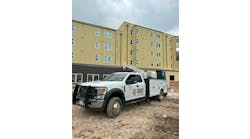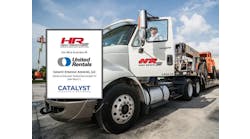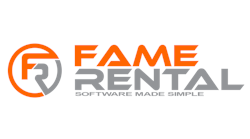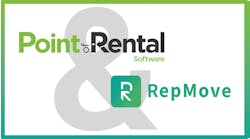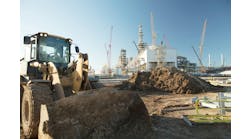You came to Terex after 22 years with United Technologies. Seems like you’re coming from a very different industry.
Not really. I spent most of my time in construction. In a lot of cases the equipment is very familiar to me except for when we get into the civil engineering aspect. Big earthmoving equipment and large trucks are different, but fascinating. I think it’s every child’s dream to grow up and manufacture some of the stuff you played with when you were kids.
What are your first impressions of the construction industry?
It’s just a great industry. There are tremendous opportunities every place I look. It’s an industry with considerable consolidation potential. I was amazed, when we went to Bauma, to find out that 12 percent of all of the manufacturers had 1 percent market share or less. That tells you how truly fragmented this whole industry is. Only the top eight or nine have greater than 2 percent market share.
Are you building or evolving your dealer network?
I’ll keep my thoughts to Terex Construction since it is the part that I run. About 73 percent of our business is European based, and only 17 percent is U.S.-based. The rest of the world is the other 10 percent. So it’s somewhat out of balance from what we’d like it to be. So as we re-balance our business structures around the world, the U.S. market and the Americas market, which is more than just the U.S., is tremendously appealing. It’s something we have to do better in. Some of that is really looking at our go-to-market strategies, looking at our dealer networks and looking at those things we want our dealers to be successful around.
We’ve looked at three things we’d like to be for our dealers. One is, we’d like our dealers to have the highest return on invested capital of anybody in the industry. So whether they sell a complete Terex line or whether they sell other lines with Terex, making more money with Terex Equipment than anything else, and making sure they not only sustain but prosper in their business and have money to re-invest in their business is absolutely critical, particularly from a cash flow standpoint. So that’s No.1.
The second one is really being a trusted business partner that actually comes into a place like Equipco and in true partnership fashion helps them to think through the strategies they need to be successful. When you’re an entrepreneur, your thoughts are involved with tactical issues 95 percent of the time. You’re thinking: “What do I have to do to make cash flow? What do I have to do for the next week, the next month, the next year?” We need to help them to think through the implications, to ask “What do I want to be three to five years from now?”
So how do we help you as a trusted partner to get there while still maintaining our ROIC numbers and still maintaining your cash flow numbers, and that’s a different model than some of the other people have in the industry.
And the third thing, which I think is easy to say but hard to do is to be easy to work with. What got Terex to where it is is high “espirit de corps” and really good speed to market. What’s going to keep us here is process orientation. The balance of making sure you don’t squeeze out entrepreneurship and speed to market while you solidify some of your processes is really the balance that we’re working on really hard. So those three things are really what we want to be and we’ve got action plans associated with all of those.
As you open your dealership in New Orleans, this looks like an exciting model as you work with a dealership group that would seem to understand the basics of a dealer’s responsibility with experience in short-term rental.
Equipco is a tremendous opportunity for us here in New Orleans and the surrounding parishes. It’s a great group of entrepreneurs. My experience has been, worldwide, if we can invest in entrepreneurs and people’s dreams, that’s the best investment you can make, you’re not going to go wrong.
They’ve got passion; they know the market. Nobody is going to know the market better than they know the market. Finance, IT, HR, purchasing logistics, quality, the go-to-market strategies, we can help them with those mechanical pieces of the business. But the actual execution, you can’t replicate that. It’s either there, the passion for that, or it’s not.
You can’t just expect to find a group of people like that or just plant somebody in here and expect them to have it.
It’s not going to work. It might work for a while, but it won’t be sustainable. But Terex has a “big tent” mentality. There’s room in the tent for everybody. It’s finding people that are passionate about their businesses, it’s making sure they have enough density of equipment that they can make a good living on it and in some cases for some markets, that may include rental, and in some cases for some markets, that may not include rental. It really is situation-specific. One size does not fit all.
This is a new start for Terex, when you come in from a different industry and you have a different set of eyes and you look at things, you ask a lot of questions. And some of those answers you get are fairly eye-opening. And I ask a lot of questions and we have very good people and we’re working as a team to go to the next level.
Obviously our CEO Ron DeFeo is a super team leader and so is Tom Riordan, our president and COO, so we’re all in this together.
Often a person coming from outside the industry will ask questions that people in the middle of it won’t, and inefficiencies can be discovered that way.
And that’s a great evolutionary change and that should help the entire industry over time. The industry is a huge industry, $68 billion worldwide. At Terex, our aspirations are not necessarily to be number 1. Our aspirations are to be the best ROIC performing company in the industry. The Chinese have a great saying, “The tall tree catches the wind.” It’s better at this point for me, for our team here, to really work hard at making sure the roots of the tree are very firm indeed. We’re happy to be a medium tall tree and build that over the next several years.
You do seem to be getting taller!
Well, we are. But construction, of all the divisions of Terex, it’s probably got the most opportunity. It’s got the most Eurocentric viewpoint. The American market in particular is a very tough market, but an important market. As we change our operations structures and some of the other pieces to be able to compete better in this market, and we get the right people and the right places at the right time, I think it’s all going to come together very nicely for us.
You’re a relative newcomer as a company.
For a long time, Terex was a holding company. We grew by acquisitions, bits and pieces here and there, and it was only fairly recently when people began to say, “We have all the pieces here to be an outstanding operated company should we choose to be that.” And as you transition from a holding company to an operating company, you have to go back and integrate all of those pieces that weren’t integrated before. And you have to look at things differently and make sense of things that are on the ground. Obviously there are going to be overlaps here and there, you have to try to straighten those out, but there’s a discipline you have to put in place to do that. The balance is while you are doing that, you want to make sure you don’t crush the entrepreneurial spirit that got you there. We got great people that way. It’s been a lot of heavy lifting but fun.
Is growing the dealer network a big part of your responsibility?
Our go-to-market strategy is very important as we have and continue to have more product lines coming into the Terex family. Whenever you have a new product line come in, it comes with different dealers in different places. So now it’s a matter of going back through the last 10 years of overlapping dealer requirements and processes and trying to make sense of it and getting down to what we think the market is going to need going forward and how we can drive those three ideals I mentioned before.
If you really want to have a dealer with a high ROIC, then you have a vested interest in having an intelligent parts program where they don’t necessarily have to stock everything at their locations.
So you’d have depots and so on?
That’s one option that we’re looking at. We’re looking at many options, but the question in this industry in my mind, at the core, is how do you fix a unit in one day? If you’re going to fix it in one day, that means you’ve got to ship three times a day. It means 7 o’clock you know it’s down, you send somebody out there by noon, you figure out the part by 1, you figure out how to get the part, maybe you have a shot at it in that scenario. If you shoot for one day, maybe it’s a day and a half. That uptime gets you the confidence in the product itself and the dealer network that allows residual rates to improve, residual rates obviously driving the pricing and your stature of market. With the right amount of oversight from the marketing and brand-building standpoint, that gets you a really nice kind of mix for the future. But it all comes down to the code that you have to crack: how do you fix a machine in one day? We’ve got some innovative ideas about how to do that.
Are you aiming at defining territories with exclusivity, similar to Caterpillar?
No, there is only one Caterpillar, we’re not looking to rebuild that. They are very successful in their business model, and they’ve been at it for 80 or 90 years and there’s a reason for that.
A lot of the manufacturers are set in their models already. We have the benefit of not being set. With all the new technologies coming out and all the new opportunities and quite frankly with people from different industries who have cracked these codes different ways before, I think we have a real opportunity to use some go-to-market strategies that may not necessarily involve having a whole bunch of equipment on hand or having a whole bunch of parts on hand but having access to those in the same time frame as the other guys.
How do you view the New Orleans market?
We met with a bunch of contractors last night. There’s a lot of demolition work to be done yet. That will move into, once demolition is complete, to foundation work and site work. That will move into more traditional construction work, that will move into infrastructure between construction points. And then that’s one side. The other side is the civil engineering side where you’ve got a lot of form structure, where there’s levees and dams and roads and other things, bridges to rebuild just to get to the point where you can move things between parts of the city. This is a decades-long recovery. I think the resilience of the people of New Orleans and the parishes surrounding it is just phenomenal. They are already back, working on things and improving things and they’ve got their sleeves rolled up and they are into it. The espirit de corps I saw last night from the contractor community was unbelievable. They are there. “This is our city, we’re going to rebuild and we’re going to come back and it’s going to be better than it was before,” is their attitude.
It’s a great story in New Orleans and unless people come down and really see it with their own eyes, I’m not sure they really and truly believe the strength of the human spirit that comes from that.
Do you have any particular priorities as president of Terex Construction?
One of the things we’re really working on is our operations footprint. We’re very Eurocentric; we have most of our manufacturing in Europe. We’re expanding very rapidly in China and India; those are tremendous markets there. We’re looking at what the optimal operations structure looks like in North America. Plus making sure we continue to peel back the onion on our distribution network here in the U.S. and take a hard look at what we have to do and what kind of oversight we need in place. And the last is products. We’ve got some great products on the boards that are coming out sequentially.
What kind of support will Terex offer dealerships?
Really it’s situation specific. We can add tremendous value in finance, purchasing logistics, IT, quality, human resources, strategy, we can add tremendous value in those areas and we are working hard to really be the kind of partner that we would want. A lot of people say that, it’s easier to say than to do. We’re putting the pieces in place to do that, [but] it’s all about execution.
Terex is moving from a holding company to an operating company. We’re probably in Chapter 2 of a long storybook. Very few times in your career do you have an opportunity to join a company where the DNA is not set yet, and that’s Terex right now. The company is going to be whatever we decide it’s going to be. So to have an opportunity to work in an environment like that, to be able to make a real strong difference and have it stick.
So nothing is off the table and you’re open to new ideas?
Absolutely. And if you get the right number of people that have that mindset, you can walk through walls.
